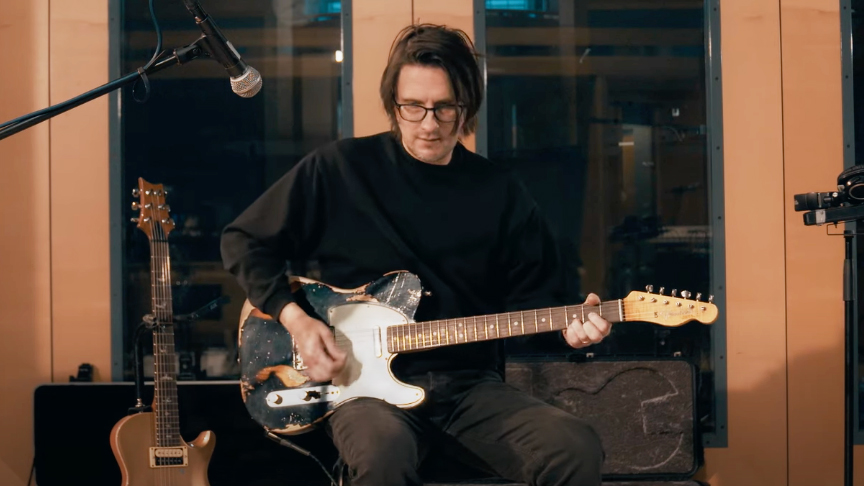The long-awaited comeback album from Porcupine Tree arrives on 24 June and Steven Wilson has lifted the lid on the gear and guitar playing behind Closure/Continuation's songs in a new video.
He outlines his love of Fender Telecasters – including the Custom Shop '63 relic'd model that he now uses 'almost exclusively' on records. "It's something about the fact I don't have to put a lot of gain on this for it to sound real, meaty and powerful," he reflects.
"And I say this only partly tongue in cheek because it is partly true, it's the only guitar that I've ever truly loved," he adds. "Because I always thought of guitars as tools… until I got this one. This is a guitar I can genuinely say I have some kind of attachment too. It feels like a treasure to me in a way that my other guitars didn't. Sorry, all the other guitars I've played but this is special."
I use a lot of major 7th chords… and it is possible to make a major 7th chord sound evil
While Wilson concedes that the new album moves away from the heavier four records before Porcupine Tree's 2010 hiatus where the musician leaned on PRS guitars, there's darkness in the musicality to Closure/Continuation.
"I use a lot of major 7th chords… and it is possible to make a major 7th chord sound evil. You wouldn't think so," says Wilson before illustrating the sinister-sounding chords from new album song Harridan. "I'm really pleased with that, the way the major sevens sound dark and mean on that track."
Wilson also demos his rig for the album in London's Air Studios it was made and showcases his openness to digital modelling, including A Strymon BigSky reverb, Hughes & Kettner AmpMan and Boss GT-1000 modelling and multi-effects processor.
One of the big mistakes a lot of guitar bands make is they think it's going to be heavier if they track their guitar four or five times
In the video Wilson breaks down new song Of The New Day's 'aggressive and mellow' sections with the tremolo and reverb clean tones. He reveals the influence of a close friend and a musician he's produced as part of Opeth, as well as collaborated with on the Storm Corrosion project.
Get the MusicRadar Newsletter
Want all the hottest music and gear news, reviews, deals, features and more, direct to your inbox? Sign up here.
"It's funny, but when I first worked with Mikeal (Åkerfeldt) from Opeth, the one thing I noticed he was doing sometimes when he would play a guitar part is he'd play it, and I was co-producing it, and I'd say, 'That sounds great Mikael.' And he'd listen to it and he'd say, 'No, I need to play it weaker.' And he meant it as a positive. I really got into that frame of mind as well.
"That's where the emotion and the sensitivity come from," he adds, illustrating his point with a playing comparison."

There's a common assumption when recording electrics guitars that more tracks equates to heaviness. Wilson has learned otherwise.
"One of the big mistakes a lot of guitar bands make is they think it's going to be heavier if they track their guitar four or five times. Get one great tone, track it twice and it sounds heavier in my experience. Or at least I've learned that over the years, particularly with the Telecaster. It takes up a lot of real estate in the mix."
Wilson also tracked bass on the album and talks through his approach and the role it took in the writing process. "I'm the other way around," he jokes about the old saying. "I'm a guitar player who's a frustrated bass player."
Visit Porcupine Tree for more info on the forthcoming album and tour dates.
Steven Wilson interview: "I fall in love with music more than the tools to make it"

Rob is the Reviews Editor for GuitarWorld.com and MusicRadar guitars, so spends most of his waking hours (and beyond) thinking about and trying the latest gear while making sure our reviews team is giving you thorough and honest tests of it. He's worked for guitar mags and sites as a writer and editor for nearly 20 years but still winces at the thought of restringing anything with a Floyd Rose.
“Every note counts and fits perfectly”: Kirk Hammett names his best Metallica solo – and no, it’s not One or Master Of Puppets
“I can write anything... Just tell me what you want. You want death metal in C? Okay, here it is. A little country and western? Reggae, blues, whatever”: Yngwie Malmsteen on classical epiphanies, modern art and why he embraces the cliff edge









